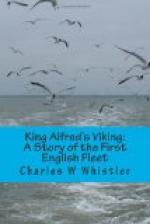Alfred and we stood before them, and the bishop raised his hand. At that we all knelt, with a strange clash and rattle of arms that went round the great host and ceased suddenly, so that the stillness was very great.
Then was only the voice of the bishop, who in a clear tone spoke the words of peace to those who should pass hence in the coming battle, that they might fight bravely, and even rejoice in death.
So he shrived the host, and at the end they said “Amen” in one voice.
Thereafter the bishop prayed to the Lord of hosts—not such a prayer as I had been wont to hear, but more wonderful, and with no boasting therein, nor, as it were, any hate of the foe, but rather the wish that the strife should make for peace, and even blessing to them.
Then he lifted his hand and blessed all the host as they bared their heads, and again the last word rolled deep and strong round the ranks, and that was all; then Alfred cried cheerily to his men, and we began our march that must needs end in battle.
There is a great road that climbs up the slope of the Polden Hills from Glastonbury and then runs along their top to Edington and beyond, and by this way we went, among pleasant woodlands. Guthrum’s own place was on the spur of Edington, because thence one looks out on all the land that Alfred held, from the fort at Stane hill to Bridgwater and Combwich and the sea beyond. That was only eight miles from us, and was the point which we would win. Thence to Bridgwater is five miles, and the town was now held in force by the Danes; and where the road leaves the hills to cross the marsh to the bridge and town, two miles away, was a camp that guarded the causeway through the level.
We went quickly as a great host may, and Alfred had so ordered matters that even as we set out from Iglea, Odda and his force were moving in battle array from the Petherton heights on the Quantock side of the town, as if to attack it. That was what Guthrum had looked for since the time we had beaten Hubba, and the only attack which could have seemed possible in any way.
It is likely that he overrated the number which Odda had with him; for those who escaped us at Combwich had not been near enough to see from the far side of the river how small our force was, and would make much of those who had been able to overcome their mightiest chief. Moreover, since that time seven weeks had gone by, and the gathering of Devon might be greater yet. So it was, indeed; but Odda had not a thousand men. Perhaps, too, the Danes feared some sally from the fens; but however it was, they made not the mistake which destroyed Hubba by despising us rashly, for Guthrum drew his whole force together, and left the hills for a march towards the town which he heard was threatened.
So when we came to Edington, Guthrum’s hill fort was empty, save for a camp guard to keep the country folk who lurked in wood and fen from pillaging it. These men fled, and we stood on the ridge without striking one blow; and King Alfred turned to us, and cried that surely his plan was working out well.




